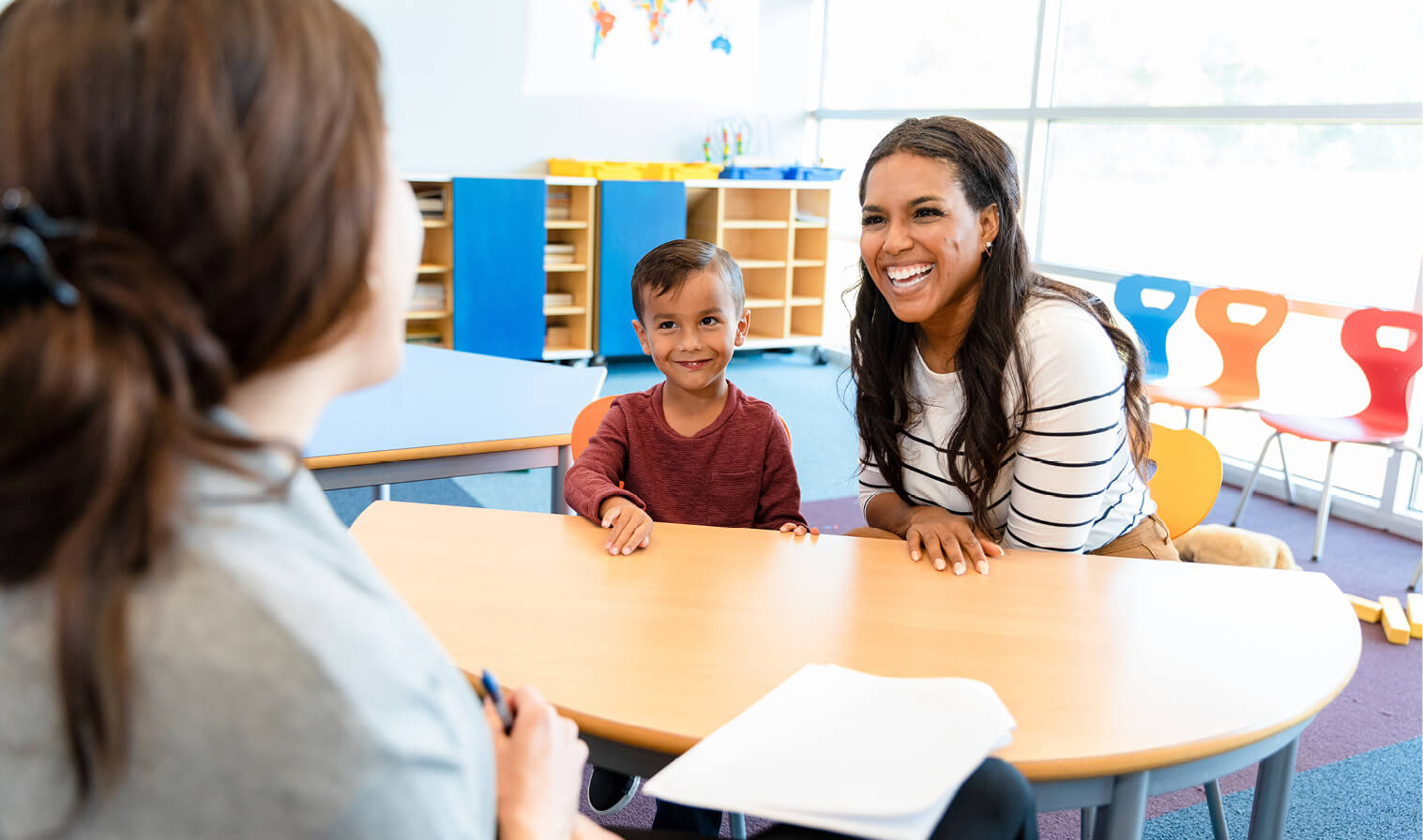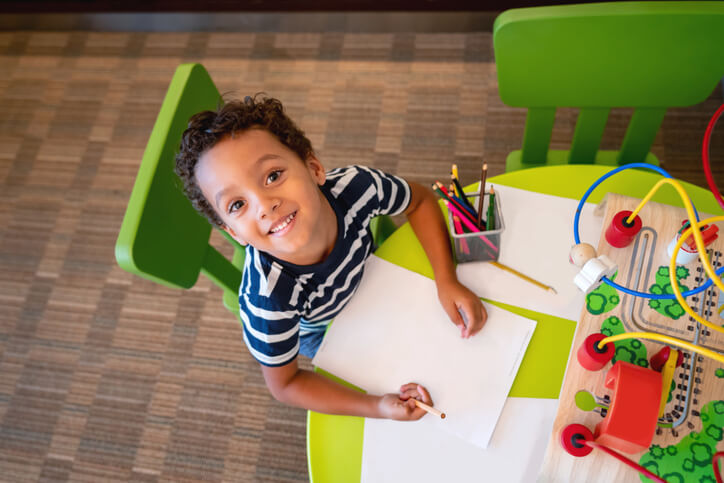Early Childhood Assistant
Learn to support children’s social, emotional and physical development through a hybrid curriculum that ends with a valuable practicum at a childcare facility. With hybrid learning, study theory online while gaining practical experience in a fully equipped early childhood lab.

Credential
Diploma
Program Length
30 – 36 weeks
Location
Toronto
Delivery method
Hybrid (online/in-person)
Program load
Full-time
Start dates
January, April, July, October
Five Steps to ECA Success at OIHI
1
EXPERT GUIDANCE
Learn from childcare professionals with years of experience in the classroom and in the field.
2
CHILDCARE LAB
Practise in facilities that emulate the many workplaces of childcare professionals, such as daycares, preschools and specialized care facilities.
3
IMMERSIVE PRACTICUM
Through a practicum with trusted OIHI partners, gain hands-on experience and see the real impact that you can have on the lives of children.
4
CAREER SUPPORT
Get help landing a fulfilling job with the guidance of Career Services, who offer support with job searches, resumes, interviews and more.
5
START WORK FASTER
While many ECA programs take as many as 50 weeks to complete, this program can be completed with 30 weeks of instruction with up to six weeks of break (depending on your start date).
Why Start Now?
108,800
new job openings across Canada between now and 2031 (jobbank.gc.ca).
$366 million
allocated by the province of Ontario to support new childcare providers (Ontario.ca).
86,000
new spaces for childcare to open across Ontario by 2026 (Ontario.ca).
How It Works

354 hours
of theory studied online.

240 hours
of practicum in a childcare facility.

126 hours
of practical lab work.
After Finishing This Program:
- Have the skills and knowledge to positively impact a child’s future.
- Become an employee who’s in demand across Canada.
- Be prepared to pursue further education as a child psychologist, early childhood educator or lead teacher.
OIHI’s Early Childcare Lab
Designed to emulate a licensed childcare centre, OIHI’s early childcare lab lets you:

Simulate real-world child learning spaces.

Interact with the tools used to support child growth.

Understand how to maintain a safe and nurturing environment for children.

Career Outcomes
Upon graduation, you will be ready to take on positions such as:
- Preschool classroom assistant
- Childcare center educator
- Early intervention assistant
- After-school program coordinator
- Parent-child program assistant
- Special education assistant
- Child development advisor
- Community outreach worker
Admission and Tuition
Admission Requirements
Academic requirements:
To be eligible for this Early Childhood Assistant program, you must:
- Have an Ontario Secondary School Diploma or equivalent; or be at least 19 years of age or older and achieve a minimum score of 15 on Wonderlic SLE.
- Equivalent: foreign credentials must be translated in English and assessed for Grade 12 equivalency by a recognized organization such as WES (World Education Service).
*For information on admission requirements, practicum and placement components, please reach out to admissions@oihi.ca.
Non-academic requirements:
In addition to the academic requirements, you are also required to provide:
- Cleared Vulnerable Sector Police Check
- Full Medical Assessment & Immunization Record
- Valid Standard First Aid and CPR-C
English Language Requirements
If English is not a student’s first language, they must provide proof of English competency.
This must be demonstrated through one of the following options:
- IELTS – International English Language Testing Services – Minimum average score of 5.5 with no subject band score lower than 5.5
- Equivalent Recognized Official Proficiency Test (see Admissions Requirements page for more information)
- Evidence of successful completion of two consecutive years of full-time equivalent post-secondary study in English at a Canadian institution
- Evidence of successful completion of two consecutive years of full-time equivalent post-secondary study in English at an institution in an English-speaking country
Tuition and Fees
| Fees Descriptions* | Amount (CAD) |
| Total Tuition | $14,500 |
| Scholarship | $3,000 |
| Final Tuition | $11,500 |
*Note that the fees shown on this page are (1) in Canadian dollars, (2), subject to change and (3) for Canadian permanent residents and citizens. International students may incur additional student fees and the international student tuition fee may vary. Program-specific costs are not included in the tuition fees listed.
FAQs
What is the career outlook for early childhood assistants?
108,800 new job openings are expected across Canada between now and 2031 (jobbank.gc.ca).
How long does it take to complete the program?
The program has 30 instructional weeks and up to six weeks of break.
Does this program involve hands-on training?
Yes, students will have the opportunity to practice their skills in our Early Childcare Lab, designed to simulate childcare environments. They will also complete a placement with an OIHI partner.
What is an early childhood assistant?
An Early Childhood Assistant (ECA) supports Early Childhood Educators in childcare settings, like daycares and preschools. Their responsibilities include helping with classroom management, supporting activities, assisting children with meals and hygiene, and maintaining a safe, clean environment. ECAs are essential for keeping the classroom organized and ensuring children receive the attention they need.
Why do people choose to become early childhood assistants?
People choose to become Early Childhood Assistants (ECAs) for various reasons, often centered around a passion for working with young children and an interest in early education. Many view it as a stepping stone to a future career as an Early Childhood Educator (ECE).
How do you become an early childhood assistant in Ontario?
Once you’ve attained an early childhood assistant (ECA) diploma, you can apply for ECA positions at daycares, preschools, or private childcare facilities.
Curriculum
Term 1:
Pedagogical Foundations to Early Childhood – 45 hours
Engage in a deep exploration and critical reflection on fundamental pedagogical theories. The students will be introduced to the ECE Code of Ethics and Standards of Practice, Child Care and Early Years Act, Canadian Charter of Rights and Freedoms, Ontario Human rights Code and the United Nations Conventions on the Rights of the Child. Through a constructivist approach, the students will examine the roles and responsibilities of a professional early childhood educator. The students will also be introduced to the changing nature of Early Childhood Education in the 21st century.
Child Development I – Prenatal to 4 Years – 45 hours
This course studies theoretical approaches to child development from the prenatal phase through middle childhood age (prenatal – 4 years). The curriculum will equip students with an understanding of typical growth and developmental patterns and will prepare them with the essential knowledge needed to articulate, devise, execute and evaluate developmentally suitable learning strategies and techniques for young children. The course also delves into early learning strategies for holistic child development and promoting strategies for wellbeing in children.
The Educational Power of Play – 30 hours
This course emphasizes the importance of play as a foundation of all learning in childhood. It also explores observation as a valuable tool for understanding and interpreting play. Students will learn the historical and current theories and will practice facilitating “child-led” learning experiences based on children’s natural curiosity. Students will learn to utilize a variety of inquiry and play-based learning strategies to promote an overall sense of belonging, wellbeing, expression and engagement in children.
Diversity and Responsive Relationships – 30 hours
This course provides an in-depth exploration of the principles, practices and policies related to inclusion in early childhood education settings. Students will examine various strategies for creating inclusive environments that support the diverse needs of all children, including those with disabilities, developmental delays and cultural or linguistic differences. Furthermore, students will both understand and develop strategies to foster inclusivity.
Child Health and Safety – 45 hours
This course offers an in-depth understanding of the principles of health and wellness that are essential for establishing safe and healthy learning spaces for young children. It addresses health and nutrition considerations for both children and adults, and emphasizes the importance of child protection. Students will also understand and analyze concepts of child abuse, neglect, risk of harm to children and learn to support the development of physical, mental health and wellbeing in children in compliance with provincial standards.
Observation – 45 hours
This course places emphasis on utilizing observation as a tool to comprehend and plan for both individual and group behaviors within the learning environment. Students will explore diverse methods of observing and documenting child behaviour. They will also practice reflection and interpretation to gain a holistic understanding of the learning, patterning and changes that occur as a child grows and develops.
Guiding Children’s Behaviour – 30 hours
This course explores various strategies and techniques for effectively guiding behaviour in early childhood education settings. Students will develop the knowledge and skills necessary to create positive and supportive learning environments for young children. Emphasis will be placed on understanding the developmental stages of children, implementing positive guidance techniques, fostering self-regulation and collaborating with families to promote healthy social-emotional development.
Special Education – 30 hours
This course provides an overview of special education principles, practices and strategies within the context of early childhood education settings. Students will explore theories, laws and best practices related to supporting children with diverse needs, including those with disabilities and developmental delays. Emphasis will be placed on understanding individual differences, promoting inclusive environments and collaborating with families and professionals.
Term 2:
Child Development II – Age 4 Years to 12 Years – 45 hours
This course will introduce students to the principles and patterns of childhood development (ages 4 -12). Students will gain the programming skills required to work with school-age children. They will also be prepared to promote the growth and development of children enrolled in full day kindergarten programs in Ontario.
Fostering Creativity in Early Childhood Education – 60 hours
This course is designed to empower future educators with the knowledge and skills necessary to cultivate creativity in both themselves as teachers and in the children they will serve. Recognizing the critical role creativity plays in cognitive development, problem-solving, and lifelong learning, this course delves into theories, strategies and practical approaches to foster a creative and enriching learning environment.
Engaging with Indigenous Communities – 60 hours
This course serves as a foundational exploration of Indigenous (First Nations, Métis, and Inuit) communities in Canada. Students will delve into the complex historical as well as the current interactions between Indigenous and non-Indigenous populations. Moreover, the course will facilitate a comprehension of the richness and diversity inherent in Indigenous societies, worldviews and knowledge, through a multi-disciplinary approach.
Field Placement Prep – 20 hours
This course aims to equip students with the skills necessary to effectively organize and execute field practice within a licensed early learning and care setting. Students will engage in ongoing reflection on their professional practices, ensuring they are prepared to navigate real-world scenarios within the early childhood education sector.
Practicum – 240 hours
Designed to bridge theoretical knowledge with hands-on practice, this practicum focuses on providing students with a unique opportunity to link their understanding of child development to the observed play interests of children.
Ready to Get Started?
Simply fill out the below form, click submit and we’ll connect with you for a free, zero-pressure consultation.
You might also be interested in
-

NACC Personal Support Worker
Help meet the growing need for personal support workers (PSW) through a hybrid curriculum recognized by employers across Ontario as the leading standard in PSW education.